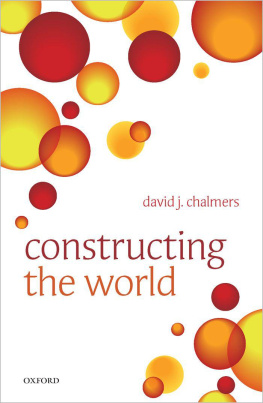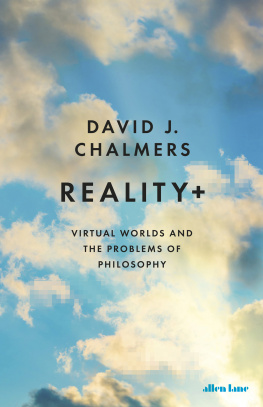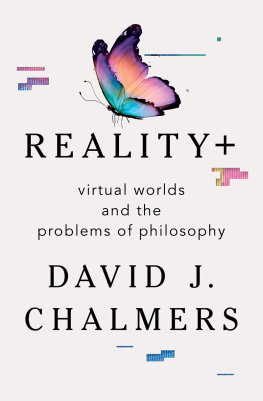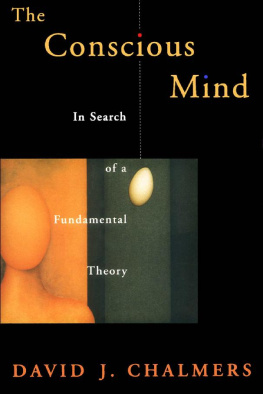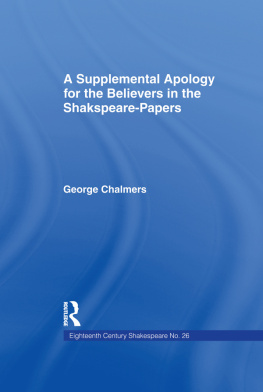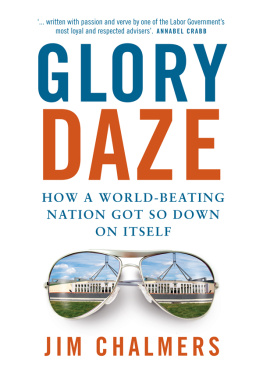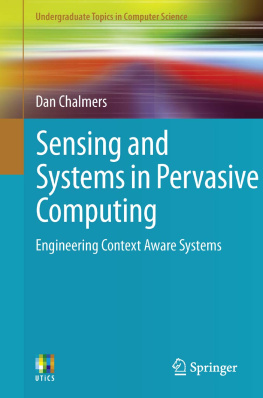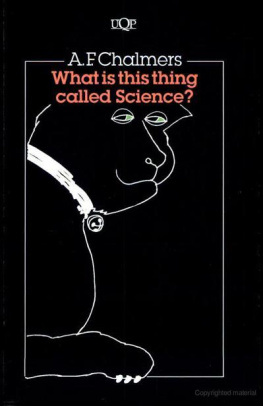David J. Chalmers - Constructing the World
Here you can read online David J. Chalmers - Constructing the World full text of the book (entire story) in english for free. Download pdf and epub, get meaning, cover and reviews about this ebook. year: 2012, publisher: Oxford University Press, USA, genre: Romance novel. Description of the work, (preface) as well as reviews are available. Best literature library LitArk.com created for fans of good reading and offers a wide selection of genres:
Romance novel
Science fiction
Adventure
Detective
Science
History
Home and family
Prose
Art
Politics
Computer
Non-fiction
Religion
Business
Children
Humor
Choose a favorite category and find really read worthwhile books. Enjoy immersion in the world of imagination, feel the emotions of the characters or learn something new for yourself, make an fascinating discovery.
- Book:Constructing the World
- Author:
- Publisher:Oxford University Press, USA
- Genre:
- Year:2012
- Rating:5 / 5
- Favourites:Add to favourites
- Your mark:
- 100
- 1
- 2
- 3
- 4
- 5
Constructing the World: summary, description and annotation
We offer to read an annotation, description, summary or preface (depends on what the author of the book "Constructing the World" wrote himself). If you haven't found the necessary information about the book — write in the comments, we will try to find it.
Constructing the World — read online for free the complete book (whole text) full work
Below is the text of the book, divided by pages. System saving the place of the last page read, allows you to conveniently read the book "Constructing the World" online for free, without having to search again every time where you left off. Put a bookmark, and you can go to the page where you finished reading at any time.
Font size:
Interval:
Bookmark:
Constructing the World
David J. Chalmers


Great Clarendon Street, Oxford, OX2 6DP, United Kingdom
Oxford University Press is a department of the University of Oxford.
It furthers the Universitys objective of excellence in research, scholarship, and education by publishing worldwide. Oxford is a registered trade mark of Oxford University Press in the UK and in certain other countries
David J. Chalmers 2012
The moral rights of the author have been asserted
First published 2012
Impression: 1
All rights reserved. No part of this publication may be reproduced, stored in a retrieval system, or transmitted, in any form or by any means, without the prior permission in writing of Oxford University Press, or as expressly permitted by law, by licence or under terms agreed with the appropriate reprographics rights organization. Enquiries concerning reproduction outside the scope of the above should be sent to the Rights Department, Oxford University Press, at the address above
You must not circulate this work in any other form and you must impose this same condition on any acquirer
British Library Cataloguing in Publication Data
Data available
Library of Congress Cataloging in Publication Data
Data available
ISBN 9780199608577
Printed in Great Britain by Clays Ltd, St Ives plc
For David and Steffi Lewis
I am grateful to the University of Oxford for the invitation to give the John Locke Lectures. That invitation helped me to write this book well before I might have otherwise. I am also grateful to All Souls College and to many Oxford philosophers and others for their warm hospitality during a memorable Oxford spring.
I have presented and discussed versions of the material in this book four times: in a reading group at the Australian National University in MarchApril 2009, in a graduate seminar at New York University in SeptemberDecember 2009, in a course of lectures at the University of Barcelona in April 2010, and in the lecture series at Oxford in MayJune 2010. I received valuable feedback on all of those occasions.
For discussion at ANU, I am grateful to Jens Christian Bjerring, David Bourget, Peter Fritz, Alan Hjek, Frank Jackson, Ole Koksvik, Stephan Leuenberger, Fiona Macpherson, Dan Marshall, Kelvin McQueen, Martine Nida-Rmelin, Brian Rabern, Gabriel Rabin, Jonathan Schaffer, Susanna Schellenberg, Wolfgang Schwarz, Nico Silins, Declan Smithies, Daniel Stoljar, Mike Titelbaum, Clas Weber, and Tobias Wilsch, among others.
For discussion at NYU, I am grateful to Eli Alshenatsky, Max Barkhausen, Ned Block, Hartry Field, Camil Golub, Paul Horwich, Robert Howell, Uriah Kriegel, Farid Masrour, Tom Nagel, Chris Peacocke, Jeff Russell, Raul Saucedo, Stephen Schiffer, Erica Shumener, Ted Sider, Jonathan Simon, Matthew Smith, Andy Snyder, Michael Strevens, and Jared Warren, among others.
For discussion at Barcelona, I am grateful to Oscar Cabaco, Jos Dez, Manuel Garca-Carpintero, Carl Hoefer, Max Klbel, Josep Maci, Genoveva Mart, Manolo Martnez, Josep Prades, Sven Rosenkrantz, Josefa Toribio, and Dan Zeman, among others.
For discussion at Oxford, I am grateful to Frank Arntzenius, Anita Avramides, Tim Bayne, Corine Besson, John Broome, Troy Cross, Cian Dorr, Antony Eagle, Philip Goff, Anandi Hattiangadi, John Hawthorne, Kelvin McQueen, Maria Lasonen-Aarnio, David Mathers, Ian Phillips, Simon Saunders, Nick Shea, Walter Sinnott-Armstrong, Maja Spener, Scott Sturgeon, David Wallace, Tim Williamson, Alastair Wilson, and Juhani Yli-Vakkuri, among others.
For correspondence about the manuscript, thanks go to Stephen Biggs, Darren Bradley, Adrian Currie, Eric Dietrich, Edward Elliott, Jonathan Kvanvig, Noa Latham, Paul Livingston, Anna-Sara Malmgren, Robert Rupert, Joe Salerno, and Chris Tucker, as well as to many of those mentioned above. For detailed written comments on the manuscript, thanks go to John Bengson, Berit Brogaard, Zoe Drayson, Melissa Ebbers, Philip Goff, Dan Greco, Ole Koksvik, Dan Korman, Kelvin McQueen, Angela Mendelovici, Adam Pautz, Chris Pincock, Brian Rabern, Gabriel Rabin, Wolfgang Schwarz, Susanna Schellenberg, Susanna Siegel, Jonathan Simon, and Robbie Williams. For useful feedback, thanks also to Farid Masrour, Sarah Moss, and participants in their seminars discussing the book manuscript at Harvard and Michigan. I am especially grateful to Kelvin McQueen for in-depth comments and discussion through this process and for compiling the index.
Thanks also go to four reviewers for Oxford University Press and to Peter Momtchiloff for his editorial guidance. Thanks to Ole Koksvik and Brian Rabern for their terrific editing. Thanks also to Zoe Drayson for suggesting the term excursus and for convincing me that it is not too pretentious to use. I am grateful to too many others to mention for useful conversation about these issues.
Parts of is closely based on Revisability and Conceptual Change in Two Dogmas of Empiricism, published in Journal of Philosophy 108: 387415, 2011. I am grateful to Frank Jackson and to the two journals for their permission to use this material.
I am grateful to Stephen Yablo for pointing out affinities between some ideas in my first book and Carnaps research program in Modal Rationalism Meets Logical Empiricism (presented at a conference in Buffalo in 1999), and to Paul Livingston for pointing out others in his 2004 book Philosophical History and the Problem of Consciousness. I am indebted to Magdalena Balcerak Jackson, Brendan Balcerak Jackson, Ben Blumson, Yuri Cath, and Daniel Stoljar for their part in a memorable reading group on the Aufbau at ANU in 2005. I presented an early version of some of these ideas as a presidential address on From the Aufbau to the Canberra Plan to the Australasian Association of Philosophy in 2006, and subsequently as a talk on a number of occasions. I am grateful to audiences on those occasions for their feedback. Thanks also to the Australian Research Council for a Federation Fellowship and two other grants that have supported work on this book.
When David Lewis died in 2001, Steffi Lewis gave me his copy of the Aufbau. That book has been my companion in writing this one. Davids philosophical influence on this book will be obvious. I am enormously grateful to him and to Steffi for their friendship and support. This book is dedicated to both of them.
In his 1814 Philosophical Essay on Probability, Pierre-Simon Laplace wrote:
An intellect which at a certain moment would know all forces that set nature in motion, and all positions of all items of which nature is composed, if this intellect were also vast enough to submit these data to analysis, it would embrace in a single formula the movements of the greatest bodies of the universe and those of the tiniest atom; for such an intellect nothing would be uncertain and the future just like the past would be present before its eyes.
Laplace suggests that given the right basic information, and sufficiently powerful reasoning, all truths about the universe can be determined. For Laplace, this basic information included truths about the fundamental laws of physics and truths about the location of all fundamental entities at a time. Let us call these the Laplacean truths. The reasoning requires an idealized vast enough intellect, which we might call a
Next pageFont size:
Interval:
Bookmark:
Similar books «Constructing the World»
Look at similar books to Constructing the World. We have selected literature similar in name and meaning in the hope of providing readers with more options to find new, interesting, not yet read works.
Discussion, reviews of the book Constructing the World and just readers' own opinions. Leave your comments, write what you think about the work, its meaning or the main characters. Specify what exactly you liked and what you didn't like, and why you think so.

